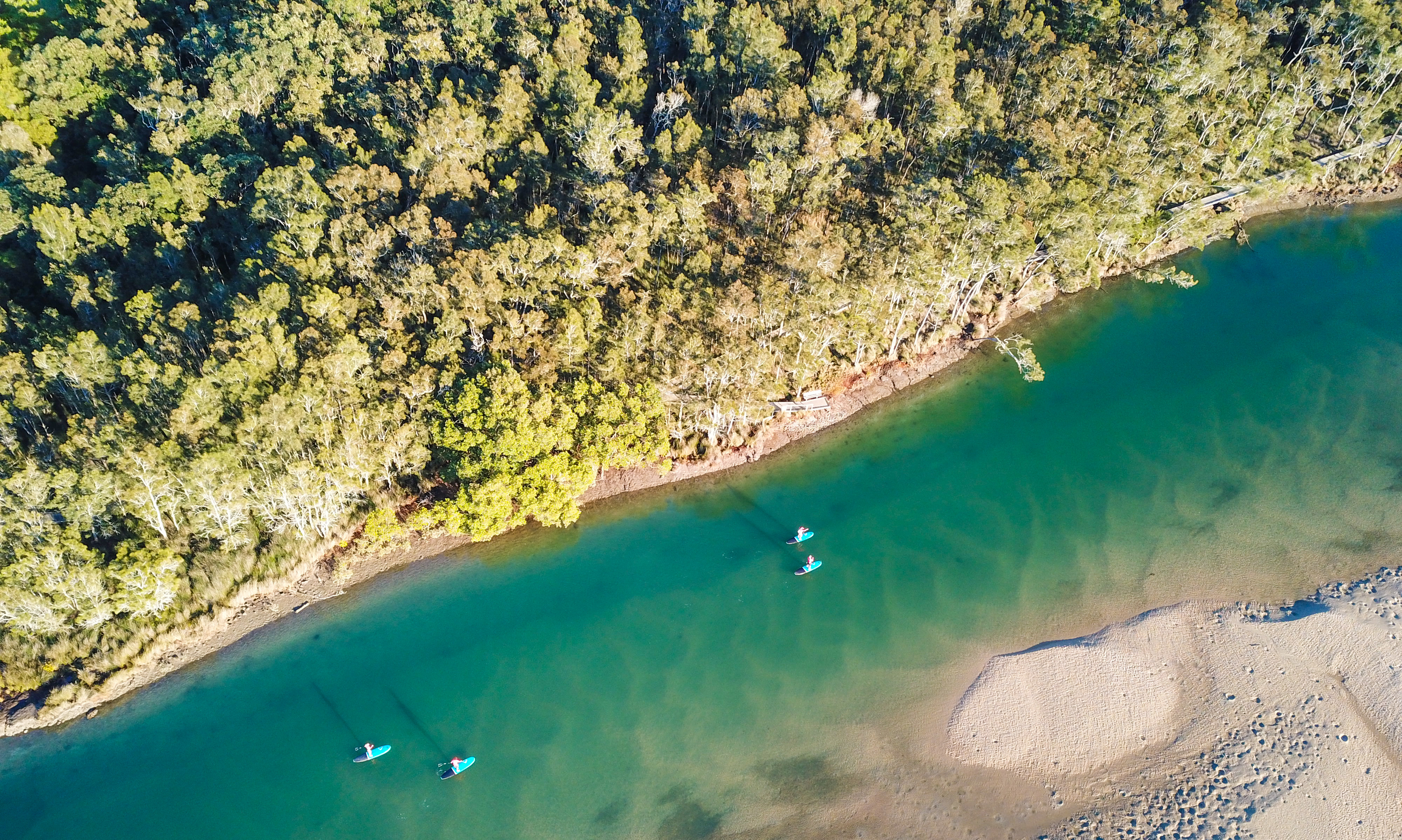Gumbaynggirr/Bundjalung man Clark Webb doesn't do anything by halves. He operates a social enterprise ecotourism business that helps fund not-for-profit Bularri Muurlay Nyanggan Aboriginal Corporation (BMNAC), which runs NSW's first and only bilingual school of an Aboriginal language, as well as language programs in 20 schools across the Coffs Harbour region.
The Gumbaynggirr are from the NSW mid north coast, a place that spans 80 kilometres of beaches, headlands, rivers, mountains and flood plains, from the Nambucca to the Clarence River and inland to the Great Dividing Range.
"I've always been proud to be Aboriginal and our parents are very supportive of our culture, but I always knew there was something missing, and thinking back now, it was language," Mr Webb said.
"When I was 14, we went to Uluru for a family holiday, and I heard language being spoken there. Then back home, I heard my Uncle Bing and Uncle Bruce speaking language and I thought it could be possible for me to speak it too, and I wanted to learn.
"Uncle Bing Laurie was the last person to speak Gumbaynggirr as his first language and, before he passed in 2019, he was a big part of the cultural revitalisation."
Mr Webb said Elders became distressed that the Gumbaynggirr language was in danger of being lost, so in 1986 they started documenting it with audio recordings and in written form.
"At first, the grammar feels all upside down and back to front and sentence structure is very different. It was hard to learn early on, but once you're immersed in it, the language flows, you just improve."
After becoming Coffs Harbour High School's first Aboriginal school captain in 2002, Mr Webb went to Sydney University to study archaeology and Aboriginal Studies. As a university student, he volunteered as a mentor for three years, visiting high schools to encourage young Aboriginal students to consider university as a pathway.
Mr Webb went on to set up the not-for-profit Bularri Muurlay Nyanggan Aboriginal Corporation (BMNAC) in 2010, which works to uplift Aboriginal youth.
"I'm really passionate about the revitalisation of our language and culture, so that's what drives Wajaana Yaam Gumbaynggirr Adventure Tours," said Mr Webb, who has been learning the Gumbaynggirr language for 14 years.
The Gumbaynggirr people have been paddling its waterways for tens of thousands of years, their ancestors using their knowledge of the tides to travel long distances in dugout canoes carved from hollowed tree trunks.
Mr Webb said Elders often refer to major tributaries and waterways as 'old highways'.
Established in 2017, Wajaana Yaam Gumbaynggirr Adventure Tours offers stand up paddle board tours, kayak and walking tours at three locations within the Solitary Islands Marine Park; the Coffs, Moonee and Red Rock Creeks.
"In one of our Dreaming stories, two sisters made the ocean and then they rested on Split Solitary Island, which we call Wirriiga," said the 39-year-old father of one.
"They placed their digging sticks in the shape of an 'X' and rested on either side of it – the younger sister on the northern side and the older sister on the southern side – before turning themselves into stone and becoming Split Solitary Island. They then made off into the night sky and became part of the Pleiades star formation, or the Seven Sisters."
A proportion of profits from the tours are invested back into language teaching programs and other projects run by the BMNAC, including the revolutionary Gumbaynggirr Giingana Freedom School.
"The reason we started Wajaana Yaam Gumbaynggirr Adventure Tours is to raise money for the school, and long term, it offers employment options for the students once they graduate as young adults, so they don't have to move away. It's a circular economy," Mr Webb said.
Gumbaynggirr Giingana Freedom School opened in 2022 with 15 students. Now in its third year, it has 71 students from Kindergarten to Year Six, with a pending application to extend it to Year 7 and 8.
The goal is to have a bilingual school up to Year 12 on a purpose-built campus.
"NSW TAFE has been outstanding in their support of the school. They've offered a premises, but the Coffs Harbour TAFE site is being decommissioned at the end of 2025, and our goal is to remain here, and purpose build our school here."
Fundraising for demountable classrooms is underway via a Chuffed Campaign which has raised more than $33,000 to date; the target is $375,000.
"We also teach Gumbaynggirr language in 20 different mainstream schools across the region, so yes, you could say the team is proper busy."
For more information, visit wajaanayaam.com.au and to donate to the Chuffed Campaign, visit https://chuffed.org/project/yilaami-helpusgrowforourchildrenandcommunity.

